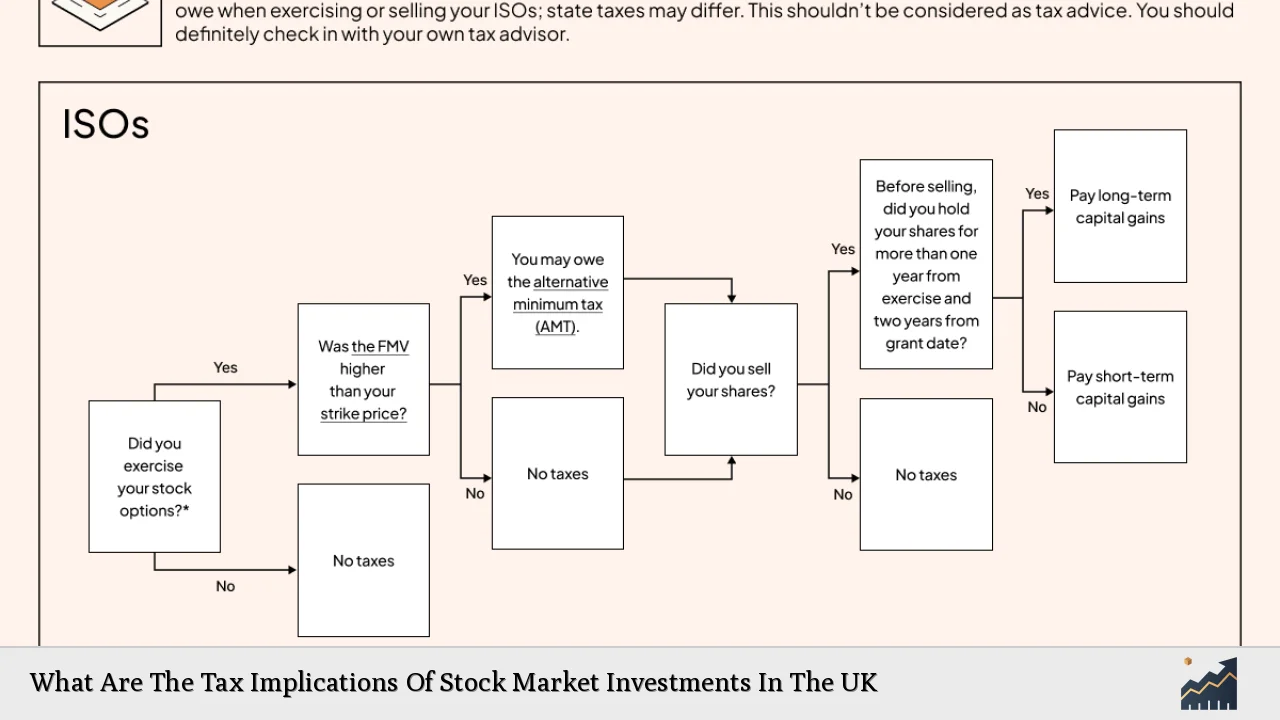Investing in the stock market can be a lucrative endeavor, but it also comes with various tax implications that investors in the UK must navigate. Understanding these tax obligations is crucial for maximizing returns and ensuring compliance with the law. This article delves into the key aspects of taxation on stock market investments in the UK, including capital gains tax (CGT), dividend tax, and other relevant considerations.
| Key Concept | Description/Impact |
|---|---|
| Capital Gains Tax (CGT) | Tax on profits from selling assets, including stocks. For the 2024/25 tax year, the allowance is £3,000, with rates of 18% for basic rate taxpayers and 24% for higher rate taxpayers. |
| Dividend Tax | Tax on income received from dividends. The tax-free allowance is £2,000 for 2024/25, with rates of 8.75% for basic rate taxpayers and 33.75% for higher rate taxpayers. |
| Stamp Duty | A flat tax of 0.5% on most share purchases, applicable at the point of transaction. |
| Individual Savings Accounts (ISAs) | Investments held in ISAs are exempt from both CGT and dividend tax, making them a popular choice for tax-efficient investing. |
| Self-Invested Personal Pensions (SIPPs) | SIPPs also provide tax advantages, allowing investments to grow without immediate taxation. |
Market Analysis and Trends
The UK stock market has seen significant fluctuations over recent years due to various economic factors, including inflation rates, interest rate changes, and geopolitical events. As of late 2024, investors are particularly focused on how recent budget changes will impact their investment strategies.
Current Market Statistics
- FTSE 100 Performance: The FTSE 100 index has shown resilience amid economic uncertainties, reflecting a diverse range of sectors.
- Inflation Rates: Inflation remains a critical concern, influencing both consumer behavior and monetary policy.
- Interest Rates: The Bank of England’s decisions regarding interest rates are closely monitored by investors as they directly affect borrowing costs and investment returns.
Emerging Trends
- Increased Focus on Tax Efficiency: With rising taxes on capital gains and dividends, investors are increasingly seeking tax-efficient investment vehicles like ISAs and SIPPs.
- Shift Towards Growth Stocks: Investors are gravitating towards growth stocks that may offer higher returns despite potential volatility.
Implementation Strategies
To effectively manage tax implications while investing in the stock market, individual investors can consider several strategies:
- Utilizing Tax-Efficient Accounts:
- Open an ISA or SIPP to shelter investments from taxes.
- Maximize contributions to these accounts to fully utilize available allowances.
- Tax Loss Harvesting:
- Offset gains by selling underperforming stocks at a loss to reduce taxable income.
- Long-Term Holding:
- Hold investments for longer than one year to benefit from lower CGT rates applicable to long-term holdings.
- Diversification:
- Spread investments across different asset classes to mitigate risk and optimize overall returns.
Risk Considerations
Investing in the stock market inherently involves risks that can be exacerbated by tax implications:
- Market Volatility: Sudden market downturns can lead to significant capital losses.
- Tax Rate Changes: Frequent changes in tax legislation can alter investment strategies unexpectedly.
- Regulatory Compliance: Investors must stay informed about regulatory changes that may affect their investments and associated taxes.
Regulatory Aspects
The UK government regularly updates tax regulations that impact stock market investments. Key regulatory considerations include:
- Capital Gains Tax Adjustments: Recent budgets have seen CGT rates increase significantly; from April 2025, basic rate taxpayers will face an 18% rate while higher-rate taxpayers will pay 24%.
- Dividend Tax Changes: With dividend allowances set at £2,000 for the upcoming tax year, understanding how this impacts income strategies is essential.
- New Regulations on Non-Domicile Status: The abolition of non-domicile status may influence investment patterns among wealthy individuals.
Future Outlook
The future landscape for stock market investments in the UK is likely to be shaped by ongoing economic developments:
- Potential Economic Recovery: As inflation stabilizes and economic growth resumes, investor sentiment may improve.
- Continued Focus on Sustainability: Environmental considerations are becoming increasingly important in investment decisions, influencing market trends.
- Technological Advancements: Innovations in trading technology may alter how investors approach stock trading and portfolio management.
Frequently Asked Questions About What Are The Tax Implications Of Stock Market Investments In The UK
- What is Capital Gains Tax (CGT) in the UK?
CGT is a tax on profits from selling assets like stocks. For the 2024/25 tax year, individuals have an allowance of £3,000 before CGT applies. - How are dividends taxed?
Dividends received above the £2,000 annual allowance are taxed at rates of 8.75% for basic rate taxpayers and 33.75% for higher-rate taxpayers. - What is Stamp Duty?
Stamp Duty is a flat rate of 0.5% applied to most share purchases in the UK. - Are there any tax benefits to using ISAs?
Yes, investments within ISAs are exempt from both CGT and dividend tax, making them a highly efficient investment vehicle. - How does holding period affect CGT?
If you hold an asset for more than one year before selling it, you may benefit from lower CGT rates compared to short-term holdings. - What should I do if my gains exceed the annual allowance?
If your gains exceed the allowance, consider offsetting them with any capital losses or utilizing tax-efficient accounts like ISAs or SIPPs. - How often do tax regulations change?
Tax regulations can change frequently; it’s essential for investors to stay informed about any updates that could impact their financial strategies. - When should I seek professional advice regarding taxes?
If you have complex financial situations or substantial investments, consulting a financial advisor or tax professional is recommended to navigate regulations effectively.
Understanding the intricate landscape of taxation related to stock market investments is vital for individual investors aiming to optimize their financial outcomes while remaining compliant with UK regulations. By leveraging available resources and strategies effectively, investors can navigate these complexities successfully.

